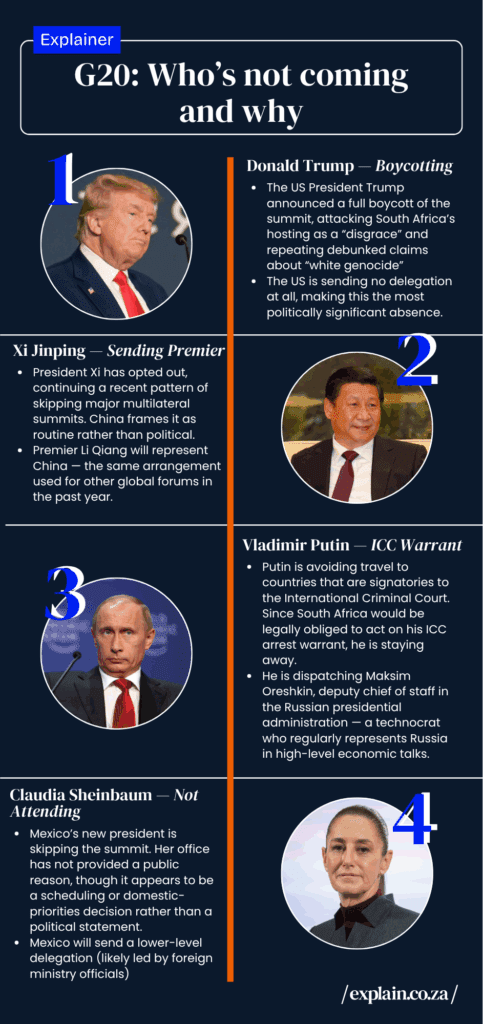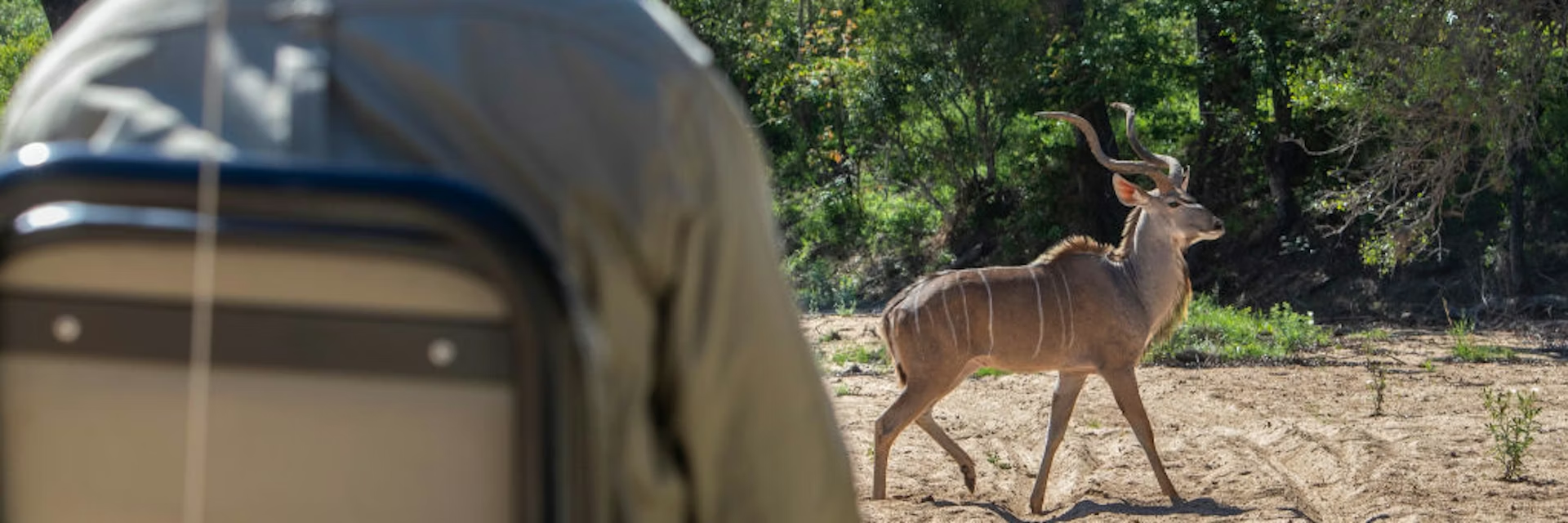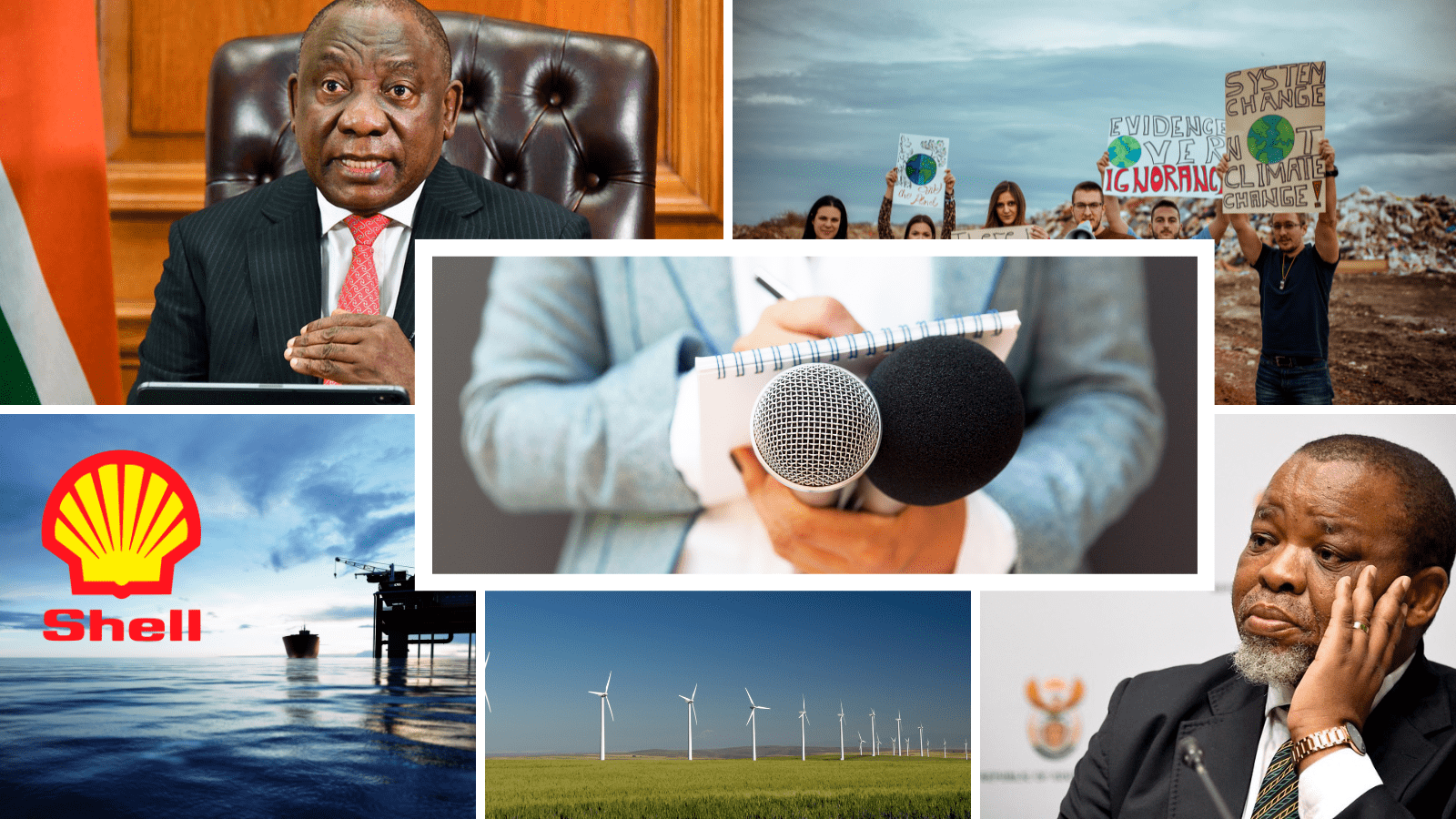This weekend, South Africa is stepping into uncharted diplomatic territory: for the first time ever, it will host a G20 Leaders’ Summit. Presidents, prime ministers and finance heavyweights from across the globe will be landing on our doorstep, in Johannesburg, for one of the biggest economic gatherings on the planet.
But what is the G20? What exactly does hosting mean, and can South Africa really use this moment to push through some serious change? Let’s unpack it.
What is the G20, anyway?
The G20, or Group of Twenty, is an international forum made up of 19 countries plus the European Union. Together, these members account for roughly 85% of global GDP and about two-thirds of the world’s population — so, yes, it’s a big deal.
Unlike, say, the UN, the G20 doesn’t have a permanent secretariat. Instead, every year a different country takes over the presidency, steering the agenda.
Why is South Africa hosting now?
South Africa assumed the G20 presidency on 1 December 2024 and will hold it until 30 November 2025. A full calendar year.
This is historic: it’s the first G20 summit on African soil, and South Africa is using it as a platform not just for national prestige, but to centre Global South priorities.
Underpinning its presidency is a theme of “Solidarity, Equality, Sustainability” — very much in the spirit of ubuntu, the African philosophy of interconnectedness. South Africa is calling for a “paradigm shift” toward more just global economic structures, predictable development finance, and debt relief for more vulnerable countries.
With just days to go, preparations are in full swing. Cabinet has given the thumbs-up, confirming South Africa is “well prepared” after over 130 meetings throughout the year. President Cyril Ramaphosa is even huddling with CEOs today to drum up business deals ahead of the big show. But it’s not all smooth sailing – expect road closures around OR Tambo Airport and Johannesburg from today until Sunday, with cargo roads rerouted and parking lots locked down. Gauteng residents, plan your detours!
Who’s coming and who’s not?
A star-studded – if somewhat depleted – lineup is set to converge on the Nasrec Expo Centre in Soweto for the 22-23 November summit, marking Africa’s long-awaited debut as G20 host. Around 65 delegations are expected in Johannesburg, according to government briefings, with sherpas already deep in negotiations over the Leaders’ Declaration.
But absences are stealing headlines: alongside US President Donald Trump’s high-profile boycott, China’s Xi Jinping announced on Friday he’s skipping too, sending Premier Li Qiang in his stead – a move Beijing downplays as routine, noting the recent pattern where the premier represents the country on key international stages.
Russia’s Vladimir Putin is also out, citing an ICC warrant, but will be sending technocrat Maksim Oreshkin, deputy chief of staff of the presidential administration, to head the Russian contingent. Mexico’s Claudia Sheinbaum, one of the G20’s newest faces since last year’s election win, will also not be in attendance.
Trump’s boycott looms largest: he’s branded South Africa’s hosting a “total disgrace” and renewing baseless claims of “white genocide” against farmers – a narrative Ramaphosa has sharply rebuffed as “lies” that won’t derail the summit. It’s a blow to consensus, but Pretoria insists the show goes on, with no US delegation at all.
The full roster still packs a punch: India’s Narendra Modi, Brazil’s Luiz Inácio Lula da Silva, the EU’s Ursula von der Leyen, and Canada’s Prime Minister Mark Carney headline the pack, joined by France’s Emmanuel Macron, Germany’s Olaf Scholz, the UK’s Keir Starmer, Japan’s Fumio Kishida, and Australia’s Anthony Albanese, among the 19 core members.
The African Union, now a permanent member of the G20, will be represented by its current AU Commission Chair, Mahmoud Ali Youssouf, who will speak for the continent’s interests.

What’s on the agenda for the developed world?
Now, let’s chat about what the big more developed countries are bringing to the table at this 2025 G20.
Places like the EU, Canada, and Japan are mostly worried about keeping the global economy on an even keel, especially with all the chaos from trade spats and leftover supply snags from the Ukraine mess.
They’re pushing hard for things like taming inflation, fixing those fragile supply chains to avoid more shortages, and locking in that 15% global minimum tax on massive tech firms to rake back billions that’ve been dodging the system. It’s all about stability first, so the world doesn’t tip into another slowdown.
Ursula von der Leyen, the EU boss, is flying in fresh from the COP30 climate talks. She’ll be banging on about knocking down trade barriers and pushing green industrial policies. Basically, she’s offering up to €545 million for joint EU-Africa projects on renewables like solar and wind – great news!
Over in Germany, Olaf Scholz is scouting deals to onshore electric vehicle battery production right here on the continent – think factories humming with jobs, pulling in our minerals like lithium and cobalt to feed Europe’s EV boom. He’s already pledged €4 billion for green energy projects across Africa by 2030, tying into the G20’s push for just transitions that don’t leave anyone behind.
In short, the wealthy nations want stability and green growth on their terms, while South Africa is trying to steer the conversation toward what Africa actually needs. It’s classic G20 tug-of-war – but fascinating to watch!
What’s in it for South Africa (and Africa)?
Alright, let’s get to the juicy bit: what’s South Africa – and by extension, the whole continent – hoping to pocket from this G20 shindig? Hosting isn’t cheap (we’re talking millions in logistics), but the upside could be massive if Ramaphosa plays his cards right.
First off, the immediate economic buzz: with multiple events already under our belt this year, the summit’s injecting R3.6 billion into tourism. Think packed restaurants, buzzing airports, and a tourism halo that lingers – all while showcasing our rainbow nation to the world’s elite.
But the real prizes are the long-game wins.
Top of the list? Debt relief. Africa is drowning in $1 trillion of arrears, choking budgets for schools and clinics. Ramaphosa’s pushing for extended pauses on repayments, fairer restructuring, and even an African credit rating agency to stop the North dictating our scores. Civil society groups are cheering him on, with 164 orgs urging bolder action just last month.
Then there’s the green gold: climate finance to fund our just energy transition. We’re eyeing pledges from rich nations for solar grids and job-safe coal phase-outs – building on that $8.5bn JETP deal. Add in reforms to the IMF and World Bank for less Western veto power, and it’s a louder mic for Africa on inequality and disaster prep.
How much power does the G20 actually have?
Here’s where things get a bit tricky. The G20 isn’t a treaty organisation: it doesn’t enforce its agreements, and it works largely on consensus-based diplomacy. That means strong words sometimes don’t translate into strong action.
Historically, G20 summits have produced declarations — long on ambition, sometimes short on delivery. Implementation often depends on political will once leaders go home. And because membership revolves around economic clout, power dynamics can skew toward richer nations. Still, G20 summits have driven important steps: coordinated financial stimulus, global tax discussions, and climate pledges, to name a few. Whether South Africa’s presidency yields real structural change will depend on how well it can rally other nations around its agenda — and whether it can turn talk into tangible policy.
Emma is a freshly graduated Journalist from Stellenbosch University, who also holds an Honours in history. She joined the explain team, eager to provide thorough and truthful information and connect with her generation.
- Emma Solomon
- Emma Solomon




